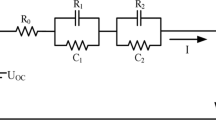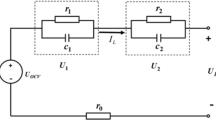Abstract
In response to the inaccurate estimation of State of Charge (SOC) in current power battery management systems, and considering that SOC may be subject to offset constraints from State of Health (SOH) when estimated separately. A method combining adaptive robust Kalman filtering with multiple innovation theories and online identification of dual Kalman filtering parameters is proposed. This control method is based on adaptive robust Kalman control. It corrects the estimated values using multiple innovation values and Kalman gains at different times. Dual Kalman filtering is used for online parameter identification and joint estimation of battery health status, which increases the amount of error information and provides an optimized method for accurate estimation of SOC and SOH. To verify the rationality of the algorithm, a second-order RC equivalent circuit model is used to characterize the dynamic characteristics of the battery, and experimental verification is carried out under different operating conditions. The experimental results show that the average error of SOC under three operating conditions: UDDS, FUDS, and US06 is 0.56%, 0.31%, and 1.23%, respectively. The estimated error of SOH after stabilization is less than 1.73%. The estimation error is the lowest among the five estimation algorithms. The proposed algorithm has been verified to have good accuracy and convergence. The multi-innovation adaptive robust dual Kalman filtering algorithm provides a theoretical basis for accurate state estimation and widespread application of lithium batteries.














Similar content being viewed by others
Data availability
The raw/processed data required to reproduce these findings cannot be shared at this time as the data also forms part of an ongoing study.
References
Dai H, Jiang B, Hu X et al (2021) Advanced battery management strategies for a sustainable energy future: multilayer design concepts and research trends[J]. Renew Sustain Energy Rev 138
Hu L, Ye Y, Bo Y et al (2022) Performance evaluation strategy for battery pack of electric vehicles: online estimation and offline evaluation[J]. Energy Rep 8:774–784
Tang H, Wu Y, Cai Y et al (2022) Design of power lithium battery management system based on digital twin[J]. Journal of Energy Storage 47:103679
Zheng L, Zhang L, Zhu J et al (2016) Co-estimation of state-of-charge, capacity and resistance for lithium-ion batteries based on a high-fidelity electrochemical model[J]. Appl Energy 180:424–434
Hu X, Feng F, Liu K et al (2019) State estimation for advanced battery management: key challenges and future trends[J]. Renew Sustain Energy Rev 114
Ko Y, Cho K, Kim M et al (2022) A novel capacity estimation method for the lithium batteries using the enhanced coulomb counting method with Kalman filtering[J]. IEEE Access 10:38793–38801
Qiao X, Wang Z, Hou E et al (2022) Online estimation of open circuit voltage based on extended Kalman filter with self-evaluation criterion[J]. Energies 15(12):4373
Wei Z, Zhao J, Zou C et al (2018) Comparative study of methods for integrated model identification and state of charge estimation of lithium-ion battery[J]. J Power Sources 402:189–197
Bruen T, Marco J (2016) Modelling and experimental evaluation of parallel connected lithium ion cells for an electric vehicle battery system[J]. J Power Sources 310:91–101
Liu C, Liu W, Wang L et al (2016) A new method of modeling and state of charge estimation of the battery[J]. J Power Sources 320:1–12
Peng N, Zhang S, Guo X et al (2021) Online parameters identification and state of charge estimation for lithium-ion batteries using improved adaptive dual unscented Kalman filter[J]. Int J Energy Res 45(1):975–990
Guo F, Hu G, **ang S et al (2019) A multi-scale parameter adaptive method for state of charge and parameter estimation of lithium-ion batteries using dual Kalman filters[J]. Energy, 178:79–88
Rzepka B, Bischof S, Blank T (2021) Implementing an extended Kalman filter for SoC estimation of a Li-ion battery with hysteresis: a step-by-step guide[J]. Energies 14(13):3733
Xu J, Wang D (2022) A dual-rate sampled multiple innovation adaptive extended Kalman filter algorithm for state of charge estimation[J]. Int J Energy Res 46(13):18796–18808
Wang D, Yang Y, Gu T (2023) A hierarchical adaptive extended Kalman filter algorithm for lithium-ion battery state of charge estimation[J]. Journal of Energy Storage 62:106831
Li J, Adewuyi K, Lotfi N et al (2018) A single particle model with chemical/mechanical degradation physics for lithium ion battery State of Health (SOH) estimation[J]. Appl Energy 212:1178–1190
Yang J, **a B, Huang W et al (2018) Online state-of-health estimation for lithium-ion batteries using constant-voltage charging current analysis[J]. Applied energy, 212:1589–1600
Ling L, Wei Y (2021) State-of-charge and state-of-health estimation for lithium-ion batteries based on dual fractional-order extended Kalman filter and online parameter identification[J]. Ieee Access 9:47588–47602
Wang D, Li X, Wang J et al (2021) Lithium-ion battery equivalent model over full-range state of charge based on electrochemical process simplification[J]. Electrochim Acta 389:138698
Pang H, Mou LJ, Guo L (2019) Parameter identification and state-of-charge estimation approach for enhanced lithium-ion battery equivalent circuit model considering influence of ambient temperatures[J]. Chin Phys B 28(10):108201
Wang Q, Gu H, Ye M et al (2021) State of charge estimation for lithium-ion battery based on NARX recurrent neural network and moving window method[J]. Ieee Access 9:83364–83375
Zhang S, Chang G, Chen C et al (2020) GNSS attitude estimation based on adaptive Kalman filtering using phase measurement[J]. IET Radar, Sonar Navigation 14(5):747–754
Moscato V, Picariello A, Sperli G (2019) Community detection based on game theory[J]. Eng Appl Artif Intell 85:773–782
Ding F, Wang X, Mao L et al (2017) Joint state and multi-innovation parameter estimation for time-delay linear systems and its convergence based on the Kalman filtering[J]. Digital Signal Processing 62:211–223
Jiang S, Song Z (2022) A review on the state of health estimation methods of lead-acid batteries[J]. J Power Sources 517
Funding
This work is supported by the National Natural Science Foundation of China (61563032, 61963025) and the Gansu Provincial Science and Technology Program (22YF7GA164, 22CX8GA131).
Author information
Authors and Affiliations
Contributions
All authors contributed to the study conception and design. Material preparation, data collection and analysis were performed by Fazhi YANG, Taohua Yu,Zhe Guan and Aimin An. The first draft of the manuscript was written by Zhe Guan and all authors commented on previous versions of the manuscript. All authors read and approved the final manuscript.
Corresponding author
Ethics declarations
Ethics approval
This study has confirmed that ethical approval is not required.
Consent to participate
Informed consent was obtained from all individual participants included in the study.
Consent for publication
Confirm that all participants have agreed to publish the paper.
Competing Interests
The authors have no relevant financial or non-financial interests to disclose.
Additional information
Publisher's Note
Springer Nature remains neutral with regard to jurisdictional claims in published maps and institutional affiliations.
Rights and permissions
Springer Nature or its licensor (e.g. a society or other partner) holds exclusive rights to this article under a publishing agreement with the author(s) or other rightsholder(s); author self-archiving of the accepted manuscript version of this article is solely governed by the terms of such publishing agreement and applicable law.
About this article
Cite this article
Guan, Z., Yang, F. ., Yu, T.h. et al. An improved multi innovation adaptive robust dual kalman filter algorithm for estimating battery state. Ionics 30, 991–1006 (2024). https://doi.org/10.1007/s11581-023-05314-2
Received:
Revised:
Accepted:
Published:
Issue Date:
DOI: https://doi.org/10.1007/s11581-023-05314-2




